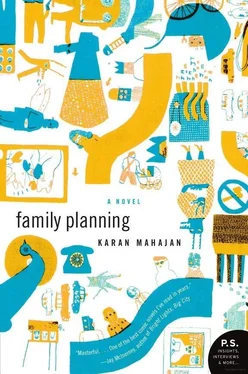After all the people had left, Rakesh said, “I have a surprise for you, darling. Just wait.”
Sangita hoped it was her mother. She hadn’t heard from her parents since her marriage and had finally broken down and written them a heartbreaking letter describing how she was a maid in the house and then scrunched up that letter and posted another one that stated she was “very happy.”
Now she wished nothing more than for her mother to see the truth in this statement.
Rakesh led an elderly lady into the bedroom. “This is Rashmi’s mother,” he said.
An awful deal was then foisted upon Sangita. She was to call Rashmi’s mother “Mama,” and allow her to be the children’s grandmother, their Nani. What would Sangita get out of it? A kind foster mother and support in bringing up the children.
Rakesh seemed to see the cruelty of this arrangement because that night in bed he started sharing with her for the first time his feelings for Rashmi. “Sangita, it was very sad. I loved her very much, and then one morning I woke up and she wasn’t there anymore. For many months I thought: If we had parked the car differently, if I had not been arguing with her on that day, it would not have happened. You understand? Thank you for being in my life.”
Apparently, he didn’t see the cruelty of talking about Rashmi.
This was when Sangita decided it wasn’t worth her time to chase after her husband’s affection; he’d never stopped grieving, and maybe he never would. She focused instead on Arjun. She needed to win Arjun’s love before he found out she was a stepmother. They were already so close. He was her chief adviser, her calm Rasputin, her deputy prime minister, her ardent bureaucrat — already a mature six while Varun bamboozled his way through his twos. Arjun helped her so much. Together, they tackled crucial questions: How to watch a lot of TV and not get sick and not have the house overrun by hordes of infants trying to teethe their way into every corner? How to keep the house compartmentalized into air-conditioned pockets, the doors hammered tight, no baby’s screams lost in the moats of hot air stagnating between rooms? And when Rakesh requested his children to roam the garden outside during one of his large political functions, introducing them to every dignitary, how would she keep them from dropping Cola bombs on the grass below, having their suits laundered with grime, plowing the lawn to fallowness with their heels?
But Rakesh, who only saw his children on their best behavior, a few hours in the day, didn’t want Arjun to be a wetnurse. He didn’t understand the sheer necessity. “He is eleven now; he should be playing sports with the other children in the colony,” he’d say, producing a cricket bat from behind his back.
But Arjun had no talent for sports; he always ended up being the umpire.
“Here, Arjun, here are some novels.”
But the Wodehouses and Christies went unread, their pages improvised as bibs.
“Arjun, why don’t you come with me to a party?”
But Arjun wouldn’t be comfortable until he had at least three younger siblings to order around and collectively corner the waiters who never otherwise served snacks or drinks to children.
Sangita felt proud that she knew her eldest son — her son! — and his obsession with crowds so well, so much so that she didn’t mind when Rakesh scolded her for “turning him into a maid” and “teaching him nothing” and certainly didn’t care that Arjun was far more spoiled than the other children, given more food, given better birthday presents, he was the oldest by four years — how could he not be spoiled?
There was another upshot to this excess attention from Mr. Ahuja: Arjun became a brat. He started standing up to his father. When Mr. Ahuja commanded him to do his homework, Arjun would snap back at him and sulk. When Mr. Ahuja asked Arjun to meet an important guest on the verandah, Arjun would settle in front of the TV and play video-games. There was no telling what Arjun would get away with next.
Rakesh was bewildered. No one ever spoke back to him. Lacking anyone else to blame, he blamed Sangita.
“I’m going to tell him,” Rakesh said one day, out of the blue. “I’m going to tell him about his mother.”
He hadn’t brought this up in five years, and Sangita panicked. She thought she could bargain her way out with sex. They now had nine children and zero privacy; they’d reverted from sex to fondling — yes, when was the last time they had made love? It was late at night in the nursery, the children were asleep, and Sangita innovated. She rose from the mat, went from cot to cot and shoved each one with her hips, so that the babies inside swung to wakefulness. They turned on their tiny fleshy backs and began a tirade of shrieking and mewling. One baby screamed, then another opened its eyes, then the whole nursery was screaming, wails rising through the room in perfect nocturnal synchronicity. She knew her older children well: they’d never wake up in the middle of the night to soothe the babies. She waited for Rakesh to reach for her. He stood from her across the room, surveying the scene like he had no role in its creation, like he was there for the first time — and panicking. She returned to the mat near the TV and waited. Slowly he started to make his way through the aisles, treading delicately, as if a false move would, through some inversion of the processes of the universe, put the screaming babies to sleep and ruin the moment. Then he couldn’t hold himself back: he came hurtling toward her.
But the satisfaction of sex — that strange, noisy lovemaking camouflaged by the wails of babies — didn’t change him. Again in the morning he said, “I’m going to tell him.”
This time Sangita took the threat seriously. She backed off from her son. She cut him off from all his baby-watching responsibilities. She followed Rakesh’s orders and untethered twelve-year-old Arjun from the family tree, the distance between Arjun and his family growing like his upwardly-mobile height-markings on the bathroom wall, his afternoons spent in the fluorescent bask of tennis courts or sharing saliva with the general populace in the Gymkhana Club Swimming Pool, his homework hot and ready on his desk when he got home, no time to shower, only the dampness of underarms as he pressed his pen to paper and knew nothing, adjusted his shorts, squeezed his legs, felt a decade-old itch in his pelvis. Of course, he was terrible at tennis and always came back from the pool complaining that someone had accidentally dived onto him while he did a lap, and the only thing good that came out of his free time was the question:
Mama. How do you and Papa have babies? Was Varun in your stomach for four years? Do you have a baby by living with someone for many years?
He’d follow Sangita around asking that question, and she’d say, Why don’t you ask your Papa? But she knew Papa was only good for banalities, for sugar-coated rhetoric, for promises he couldn’t keep (she imagined him saying: I must thank the people — the people! — for making my wife pregnant .), that the relationship between mother and father and children was such that the children learned everything valuable from the mother and pretended to be grown-up and competent before the father.
But she ignored Arjun now. It broke her heart to be short and curt with him when he tried to help, but she felt their relationship would only worsen if he knew she wasn’t even his real mother. After all these years and a dozen children, she still felt unworthy of love.
So she threw herself into the organizational problems of managing her children. She used delegation. Divide and rule. Even terror. She sent the girls on elaborate spying missions (What does the maid eat when I am not looking? Which baby needs new diapers?) payable entirely in TV-viewing-time. She was all but powerless without the Cartoon Network, her favorite mode of bribery. It was almost fun.
Читать дальше












